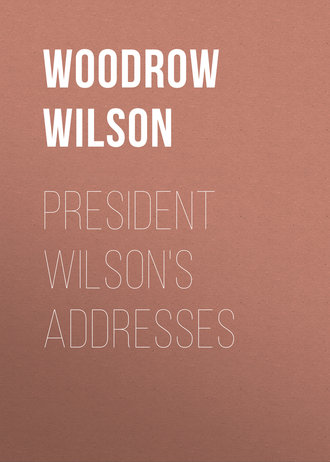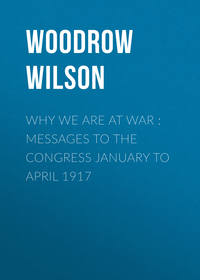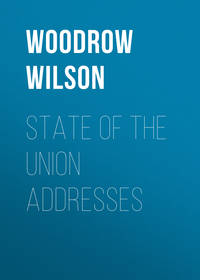 полная версия
полная версияPresident Wilson's Addresses
I sometimes think that it is true that no people ever went to war with another people. Governments have gone to war with one another. Peoples, so far as I remember, have not, and this is a government of the people, and this people is not going to choose war. But we are not dealing with people; we are dealing with Governments. We are dealing with Governments now engaged in a great struggle, and therefore we do not know what a day or an hour will bring forth. All that we know is the character of our own duty. We do not want the question of peace and war, or the conduct of war, entrusted too entirely to our Government. We want war, if it must come, to be something that springs out of the sentiments and principles and actions of the people themselves; and it is on that account that I am counseling the Congress of the United States not to take the advice of those who recommend that we should have, and have very soon, a great standing Army, but, on the contrary, to see to it that the citizens of this country are so trained and that the military equipment is so sufficiently provided for them that when they choose they can take up arms and defend themselves.
The Constitution of the United States makes the President the Commander in Chief of the Army and Navy of the Nation, but I do not want a big Army subject to my personal command. If danger comes, I want to turn to you and the rest of my fellow-countrymen and say, "Men, are you ready?" and I know what the response will be. I know that there will spring up out of the body of the Nation a great host of free men, and I want those men not to be mere targets for shot and shell. I want them to know something of the arms they have in their hands. I want them to know something about how to guard against the diseases that creep into camps, where men are unaccustomed to live. I want them to know something of what the orders mean that they will be under when they enlist under arms for the Government of the United States. I want them to be men who can comprehend and easily and intelligently step into the duty of national defense. That is the reason that I am urging upon the Congress of the United States at any rate the beginnings of a system by which we may give a very considerable body of our fellow-citizens the necessary training.
I have not forgotten the great National Guard of this country, but in this country of 100,000,000 people there are only 129,000 men in the National Guard; and the National Guard, fine as it is, is not subject to the orders of the President of the United States. It is subject to the orders of the Governors of the several States, and the Constitution itself says that the President has no right to withdraw them from their States even, except in the case of actual invasion of the soil of the United States. I want the Congress of the United States to do a great deal for the National Guard, but I do not see how the Congress of the United States can put the National Guard at the disposal of the national authorities. Therefore it seems to me absolutely necessary that in addition to the National Guard there should be a considerable body of men with some training in the military art who will have pledged themselves to come at the call of the Nation.
I have been told by those who have a greater knack at guessing statistics than I have that there are probably several million men in the United States who, either in this country or in other countries from which they have come to the United States, have received training in arms. It may be; I do not know, and I suspect that they do not either, but even if it be true, these men are not subject to the call of the Federal Government. They would have to be found; they would have to be induced to enlist; they would have to be organized; their numbers are indefinite; and they would have to be equipped. Such are not the materials which we need. We want to know who these men are and where they are and to have everything ready for them if they should come to our assistance. For we have now got down, not to the sentiment of national defense, but to the business of national defense. It is a business proposition and it must be treated as such. And there are abundant precedents for the proposals which have been made to the Congress. Even that arch-Democrat, Thomas Jefferson, believed that there ought to be compulsory military training for the adult men of the Nation, because he believed, as every true believer in democracy believes, that it is upon the voluntary action of the men of a great Nation like this that it must depend for its military force.
There is another misapprehension that I want to remove from your minds: Do not think that I have come to talk to you about these things because I doubt whether they are going to be done or not. I do not doubt it for a moment, but I believe that when great things of this sort are going to be done the people of this country are entitled to know just what is being proposed. As a friend of mine says, I am not arguing with you; I am telling you. I am not trying to convert you to anything, because I know that in your hearts you are converted already, but I want you to know the motives of what is proposed and the character of what is proposed, in order that we should have only one attitude and counsel with regard to this great matter.
It is being very sedulously spread abroad in this country that the impulse back of all this is the desire of men who make the materials of warfare to get money out of the Treasury of the United States. I wish the people that say that could see meetings like this. Did you come here for that purpose? Did you come here because you are interested to see some of your fellow-citizens make money out of the present situation? Of course you did not. I am ready to admit that probably the equipment of those men whom we are training will have to be bought from somebody, and I know that if the equipment is bought, it will have to be paid for; and I dare say somebody will make some money out of it. It is also true, ladies and gentlemen, that there are men now, a great many men, in the belligerent countries who are growing rich out of the sale of the materials needed by the armies of those countries. If the Government itself does not manufacture everything that an army needs, somebody has got to make money out of it, and I for my part have been urging the Congress of the United States to make the necessary preparations by which the Government can manufacture armor plate and munitions, so that, being in the business itself and having the ability to manufacture all it needs, if it is put upon a business basis, it can at any rate keep the price that it pays within moderate and reasonable limits. The Government of the United States is not going to be imposed upon by anybody, and you may rest assured, therefore, that while I believe you prefer that private capital and private initiative should bestir themselves in these matters, it is also possible, and I assure you that it is most likely, that the Government of the United States will have adequate means of controlling this matter very thoroughly indeed. There need be no fear on that side. Let nobody suppose that this is a money-making agitation. I would for one be ashamed to be such a dupe as to be engaged in it if it had any suspicion of that about it, but I am not as innocent as I look; and I believe that I can say for my colleagues in Washington that they are just as watchful in such matters as you would desire them to be.
And there is another misapprehension that I do not wish you to entertain. Do not suppose that there is any new or sudden or recent inadequacy on the part of this Government in respect of preparation for national defense. I have heard some gentlemen say that we had no coast defenses worth talking about. Coast defenses are not nowadays advertised, you understand, and they are not visible to the naked eye, so that if you passed them and nothing exploded, you would not know they were there. The coast defenses of the United States, while not numerous enough, are equipped in the most modern and efficient fashion. You are told that there has been some sort of neglect about the Navy. There has not been any sort of neglect about the Navy. We have been slowly building up a Navy which in quality is second to no navy in the world. The only thing it lacks is quantity. In size it is the fourth navy in the world, though I have heard it said by some gentlemen in this very region that it was the second. In fighting force, though not in quality, it is reckoned by experts to be the fourth in rank in the world; and yet when I go on board those ships and see their equipment and talk with their officers I suspect that they could give an account of themselves which would raise them above the fourth class. It reminds me of that very quaint saying of the old darky preacher, "The Lord says unto Moses, come fourth, and he came fifth and lost the race." But I think this Navy would not come fourth in the race, but higher.
What we are proposing now is not the sudden creation of a Navy, for we have a splendid Navy, but the definite working out of a program by which within five years we shall bring the Navy to a fighting strength which otherwise might have taken eight or ten years; along exactly the same lines of development that have been followed and followed diligently and intelligently for at least a decade past. There is no sudden panic, there is no sudden change of plan; all that has happened is that we now see that we ought more rapidly and more thoroughly than ever before to do the things which have always been characteristic of America. For she has always been proud of her Navy and has always been addicted to the principle that her citizenship must do the fighting on land. We are working out American principle a little faster, because American pulses are beating a little faster, because the world is in a whirl, because there are incalculable elements of trouble abroad which we cannot control or alter. I would be derelict to the duty which you have laid upon me if I did not tell you that it was absolutely necessary to carry out our principles in this matter now and at once.
And yet all the time, my fellow-citizens, I believe that in these things we are merely interpreting the spirit of America. Who shall say what the spirit of America is? I have many times heard orators apostrophize this beautiful flag which is the emblem of the Nation. I have many times heard orators and philosophers speak of the spirit which was resident in America. I have always for my own part felt that it was an act of audacity to attempt to characterize anything of that kind, and when I have been outside of the country in foreign lands and have been asked if this, that, or the other was true of America I have habitually said, "Nothing stated in general terms is true of America, because it is the most variegated and varied and multiform land under the sun." Yet I know that if you turn away from the physical aspects of the country, if you turn away from the variety of the strains of blood that make up our great population, if you turn away from the great variations of occupation and of interest among our fellow-citizens, there is a spiritual unity in America. I know that there are some things which stir every heart in America, no matter what the racial derivation or the local environment, and one of the things that stirs every American is the love of individual liberty. We do not stand for occupations. We do not stand for material interests. We do not stand for any narrow conception even of political institutions; but we do stand for this, that we are banded together in America to see to it that no man shall serve any master who is not of his own choosing. And we have been very liberal and generous about this idea. We have seen great peoples, for the most part not of the same blood with ourselves, to the south of us build up polities in which this same idea pulsed and was regnant, this idea of free institutions and individual liberty, and when we have seen hands reached across the water from older political polities to interfere with the development of free institutions on the Western Hemisphere we have said: "No; we are the champions of the freedom of popular sovereignty wherever it displays or exercises itself throughout both Americas." We are the champions of a particular sort of freedom, the sort of freedom which is the only foundation and guarantee of peace.
Peace lies in the hearts of great industrial and agricultural populations, and we have arranged a government on this side of the water by which their preferences and their predilections and their interests are the mainsprings of government itself. And so when we prepare for national defense we prepare for national political integrity; we prepare to take care of the great ideals which gave birth to this Government; we are going back in spirit and in energy to those great first generations in America, when men banded themselves together, though they were but a handful upon a single coast of the Atlantic, to set up in the world the standards which have ever since floated everywhere that Americans asserted the power of their Government. As I came along the line of the railway to-day, I was touched to observe that everywhere, upon every railway station, upon every house, where a flag could be procured, some temporary standard had been raised from which there floated the stars and stripes. They seemed to have divined the errand upon which I had come, to remind you that we must subordinate every individual interest and every local interest to assert once more, if it should be necessary to assert them, the great principles for which that flag stands.
Do not deceive yourselves, ladies and gentlemen, as to where the colors of that flag came from. Those lines of red are lines of blood, nobly and unselfishly shed by men who loved the liberty of their fellow-men more than they loved their own lives and fortunes. God forbid that we should have to use the blood of America to freshen the color of that flag; but if it should ever be necessary again to assert the majesty and integrity of those ancient and honorable principles, that flag will be colored once more, and in being colored will be glorified and purified.
THE SUBMARINE QUESTION
[Address delivered at a joint session of the two Houses of Congress, April 19, 1916.]
Gentlemen of the Congress:
A situation has arisen in the foreign relations of the country of which it is my plain duty to inform you very frankly.
It will be recalled that in February, 1915, the Imperial German Government announced its intention to treat the waters surrounding Great Britain and Ireland as embraced within the seat of war and to destroy all merchant ships owned by its enemies that might be found within any part of that portion of the high seas, and that it warned all vessels, of neutral as well as of belligerent ownership, to keep out of the waters it had thus proscribed or else enter them at their peril. The Government of the United States earnestly protested. It took the position that such a policy could not be pursued without the practical certainty of gross and palpable violations of the law of nations, particularly if submarine craft were to be employed as its instruments, inasmuch as the rules prescribed by that law, rules founded upon principles of humanity and established for the protection of the lives of non-combatants at sea, could not in the nature of the case be observed by such vessels. It based its protest on the ground that persons of neutral nationality and vessels of neutral ownership would be exposed to extreme and intolerable risks, and that no right to close any part of the high seas against their use or to expose them to such risks could lawfully be asserted by any belligerent government. The law of nations in these matters, upon which the Government of the United States based its protest, is not of recent origin or founded upon merely arbitrary principles set up by convention. It is based, on the contrary, upon manifest and imperative principles of humanity and has long been established with the approval and by the express assent of all civilized nations.
Notwithstanding the earnest protest of our Government, the Imperial German Government at once proceeded to carry out the policy it had announced. It expressed the hope that the dangers involved, at any rate the dangers to neutral vessels, would be reduced to a minimum by the instructions which it had issued to its submarine commanders, and assured the Government of the United States that it would take every possible precaution both to respect the rights of neutrals and to safeguard the lives of non-combatants.
What has actually happened in the year which has since elapsed has shown that those hopes were not justified, those assurances insusceptible of being fulfilled. In pursuance of the policy of submarine warfare against the commerce of its adversaries, thus announced and entered upon by the Imperial German Government in despite of the solemn protest of this Government, the commanders of German undersea vessels have attacked merchant ships with greater and greater activity, not only upon the high seas surrounding Great Britain and Ireland but wherever they could encounter them, in a way that has grown more and more ruthless, more and more indiscriminate as the months have gone by, less and less observant of restraints of any kind; and have delivered their attacks without compunction against vessels of every nationality and bound upon every sort of errand. Vessels of neutral ownership, even vessels of neutral ownership bound from neutral port to neutral port, have been destroyed along with vessels of belligerent ownership in constantly increasing numbers. Sometimes the merchantman attacked has been warned and summoned to surrender before being fired on or torpedoed; sometimes passengers or crews have been vouchsafed the poor security of being allowed to take to the ship's boats before she was sent to the bottom. But again and again no warning has been given, no escape even to the ship's boats allowed to those on board. What this Government foresaw must happen has happened. Tragedy has followed tragedy on the seas in such fashion, with such attendant circumstances, as to make it grossly evident that warfare of such a sort, if warfare it be, cannot be carried on without the most palpable violation of the dictates alike of right and of humanity. Whatever the disposition and intention of the Imperial German Government, it has manifestly proved impossible for it to keep such methods of attack upon the commerce of its enemies within the bounds set by either the reason or the heart of mankind.
In February of the present year the Imperial German Government informed this Government and the other neutral governments of the world that it had reason to believe that the Government of Great Britain had armed all merchant vessels of British ownership and had given them secret orders to attack any submarine of the enemy they might encounter upon the seas, and that the Imperial German Government felt justified in the circumstances in treating all armed merchantmen of belligerent ownership as auxiliary vessels of war, which it would have the right to destroy without warning. The law of nations has long recognized the right of merchantmen to carry arms for protection and to use them to repel attack, though to use them, in such circumstances, at their own risk; but the Imperial German Government claimed the right to set these understandings aside in circumstances which it deemed extraordinary. Even the terms in which it announced its purpose thus still further to relax the restraints it had previously professed its willingness and desire to put upon the operations of its submarines carried the plain implication that at least vessels which were not armed would still be exempt from destruction without warning and that personal safety would be accorded their passengers and crews; but even that limitation, if it was ever practicable to observe it, has in fact constituted no check at all upon the destruction of ships of every sort.
Again and again the Imperial German Government has given this Government its solemn assurances that at least passenger ships would not be thus dealt with, and yet it has again and again permitted its undersea commanders to disregard those assurances with entire impunity. Great liners like the Lusitania and the Arabic and mere ferryboats like the Sussex have been attacked without a moment's warning, sometimes before they had even become aware that they were in the presence of an armed vessel of the enemy, and the lives of non-combatants, passengers and crew, have been sacrificed wholesale, in a manner which the Government of the United States cannot but regard as wanton and without the slightest color of justification. No limit of any kind has in fact been set to the indiscriminate pursuit and destruction of merchantmen of all kinds and nationalities within the waters, constantly extending in area, where these operations have been carried on; and the roll of Americans who have lost their lives on ships thus attacked and destroyed has grown month by month until the ominous toll has mounted into the hundreds.
One of the latest and most shocking instances of this method of warfare was that of the destruction of the French cross-Channel steamer Sussex. It must stand forth, as the sinking of the steamer Lusitania did, as so singularly tragical and unjustifiable as to constitute a truly terrible example of the inhumanity of submarine warfare as the commanders of German vessels have for the past twelvemonth been conducting it. If this instance stood alone, some explanation, some disavowal by the German Government, some evidence of criminal mistake or wilful disobedience on the part of the commander of the vessel that fired the torpedo might be sought or entertained; but unhappily it does not stand alone. Recent events make the conclusion inevitable that it is only one instance, even though it be one of the most extreme and distressing instances, of the spirit and method of warfare which the Imperial German Government has mistakenly adopted, and which from the first exposed that Government to the reproach of thrusting all neutral rights aside in pursuit of its immediate objects.
The Government of the United States has been very patient. At every stage of this distressing experience of tragedy after tragedy in which its own citizens were involved it has sought to be restrained from any extreme course of action or of protest by a thoughtful consideration of the extraordinary circumstances of this unprecedented war, and actuated in all that it said or did by the sentiments of genuine friendship which the people of the United States have always entertained and continue to entertain towards the German nation. It has of course accepted the successive explanations and assurances of the Imperial German Government as given in entire sincerity and good faith, and has hoped, even against hope, that it would prove to be possible for the German Government so to order and control the acts of its naval commanders as to square its policy with the principles of humanity as embodied in the law of nations. It has been willing to wait until the significance of the facts became absolutely unmistakable and susceptible of but one interpretation.
That point has now unhappily been reached. The facts are susceptible of but one interpretation. The Imperial German Government has been unable to put any limits or restraints upon its warfare against either freight or passenger ships. It has therefore become painfully evident that the position which this Government took at the very outset is inevitable, namely, that the use of submarines for the destruction of an enemy's commerce is of necessity, because of the very character of the vessels employed and the very methods of attack which their employment of course involves, incompatible with the principles of humanity, the long established and incontrovertible rights of neutrals, and the sacred immunities of non-combatants.
I have deemed it my duty, therefore, to say to the Imperial German Government that if it is still its purpose to prosecute relentless and indiscriminate warfare against vessels of commerce by the use of submarines, notwithstanding the now demonstrated impossibility of conducting that warfare in accordance with what the Government of the United States must consider the sacred and indisputable rules of international law and the universally recognized dictates of humanity, the Government of the United States is at last forced to the conclusion that there is but one course it can pursue; and that unless the Imperial German Government should now immediately declare and effect an abandonment of its present methods of warfare against passenger and freight carrying vessels this Government can have no choice but to sever diplomatic relations with the Government of the German Empire altogether.







